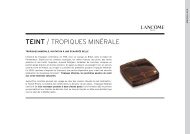Art Market Magazine - Visit zone-secure.net
Art Market Magazine - Visit zone-secure.net
Art Market Magazine - Visit zone-secure.net
You also want an ePaper? Increase the reach of your titles
YUMPU automatically turns print PDFs into web optimized ePapers that Google loves.
And yet at that time, you were spoilt for choice!<br />
I have always thought so, and that's why I was very<br />
open to Russian Constructivism and De Stijl, which<br />
both contributed to the rapid development of the<br />
Bauhaus. I mentioned Malevich five minutes ago,<br />
but I was also close to El Lissitzky. Between 1923 and<br />
1932, I published my famous magazine Merz.<br />
Constructivism was a key element in it, as were all<br />
the new ideas. Even my work in the Twenties gained<br />
in structure under all these influences. I came to<br />
think that every form was the fixed, instant image of<br />
a process.<br />
Meaning?<br />
(Irritated) I don't believe it - you really have to have<br />
everything explained to you! Well, then, when you<br />
have a system, you arrive at the fixation of an idea,<br />
just as the developer brings out a photograph on<br />
the paper. Do you see? Obviously not. This is the<br />
adman talking to you. In 1924, I founded my own<br />
advertising agency, the Merz Werbezentrale, which<br />
was very successful. It provided an opportunity to<br />
launch new forms and highly original typographies. I<br />
really loved that period - I travelled all over Europe,<br />
really enjoyed life, and made a lot of money while<br />
building up a solid reputation as a highly eccentric<br />
businessman.<br />
Yet another occasion to recycle your Merz!<br />
You know, my greatest success between the<br />
wars was the Merzbau, a building I was never able to<br />
finish, and which was destroyed during an air raid in<br />
1943. (Getting worked up) That was my ultimate aspiration<br />
- a place that brought together the art and<br />
non-art of a totally Merz world! Max Ernst used to say<br />
that it was an enormous abstract grotto. In fact, it<br />
was an autobiographical building, linking places<br />
that were each more astonishing than the next.<br />
(Looking at us with dismay) You seem to be out of<br />
your depth again…<br />
And then what happened during the Thirties?<br />
That was the end of the prosperous years… With the<br />
arrival of Hitler, my links with international modernism<br />
were broken, and I had to get out. Obviously,<br />
THE IMAGINARY INTERVIEW THE MAGAZINE<br />
Germany didn't forget about me, and I had the<br />
honour of taking part in an exhibition of "degenerate<br />
art" in 1937. If the circumstances had been less<br />
tragic, I would have said that this was an extraordinary<br />
event, because it contained everything that<br />
was significant in German art.<br />
Where did you go during the war?<br />
First Norway, then England. I was interned on the<br />
Isle of Man, alongside a lot of German artists and<br />
intellectuals. I tried to immerse myself again in the<br />
golden years of the Merz, but to my amazement,<br />
I was considered a has-been, as the British say, by<br />
the younger generation. (Sighing) For them, I was a<br />
pathetic relic of a distant avant-garde with middleclass<br />
attitudes. When things settled down, I was able<br />
to move to London with my son. I haven't really<br />
moved much since then, and I do the portraits of a<br />
few upstarts to earn a living, as I did when I was<br />
younger. Destiny is a bit of a joker, don't you think?<br />
I continued with my collages, of course, incorporating<br />
advertisements from American newspapers.<br />
At the beginning of the year, the MoMA in New York<br />
remembered the old celebrity I had become, and<br />
commissioned an entire wall of relief collages: I'm in<br />
the middle of working on it (with a mischievous<br />
glance): it's called the Merzbarn!<br />
Once a Merz, always a Merz, obviously!<br />
As you say… On reflection, maybe it's my biggest<br />
mistake. Because I've gone too far, I don't think I'll<br />
ever be part of the pantheon of great artists, despite<br />
Dada and all the success I achieved during the Twenties.<br />
Do you know why I relegated myself to the<br />
margin, despite myself? Because in the end,<br />
I'm anything but a professional anti-establishment<br />
man.… Interview by Dimitri Joannidès<br />
I<br />
"Schwitters in Britain", Tate Britain, Millbank, London, UK -<br />
Until 12 May. www.tatebritain.com<br />
W<br />
N° 23 I GAZETTE DROUOT INTERNATIONAL<br />
87
















